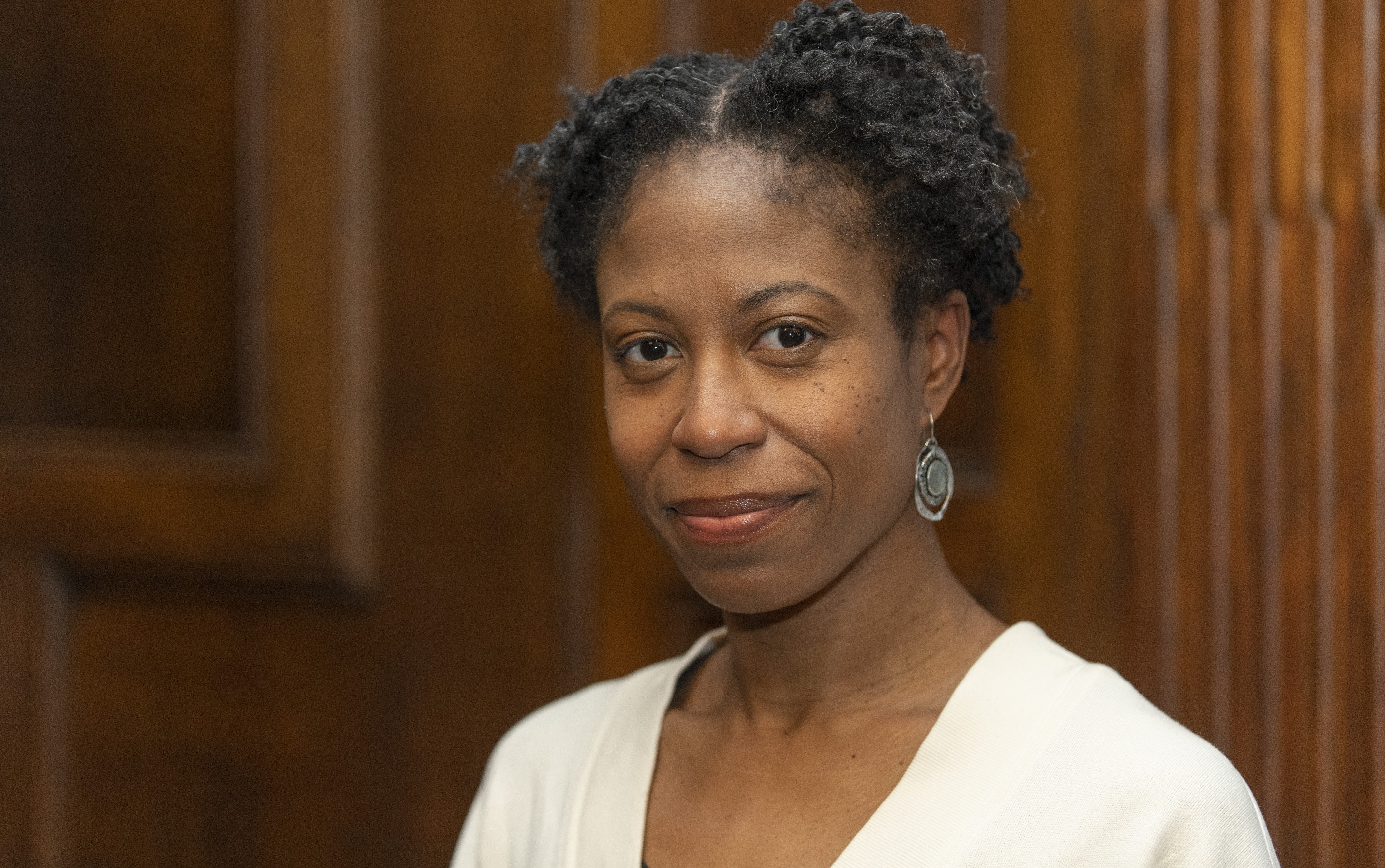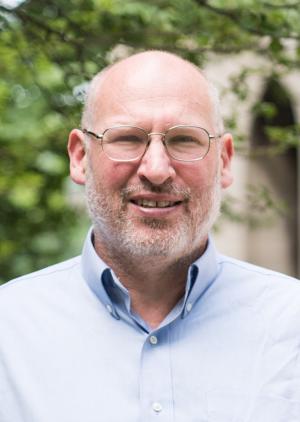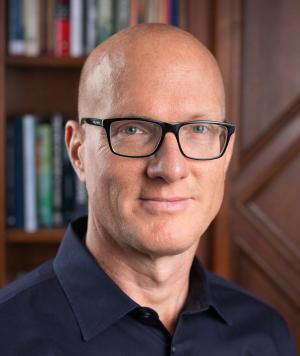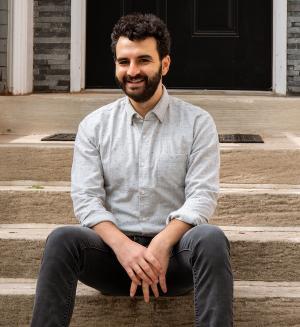
New York University, PhD '10
BIOGRAPHY
Rashauna Johnson is a historian of the 19th-century African diaspora, with an emphasis on slavery and emancipation in the US South and Atlantic World. She is especially interested in the limits and possibilities of archival histories of enslaved and freed people and the worlds in which they labored and lived. Johnson teaches courses on race, slavery, and nation; methodologies of slavery studies; and the 19th-century US.
Johnson is the author of Slavery’s Metropolis: Unfree Labor in New Orleans during the Age of Revolutions (Cambridge UP, 2016; paperback 2018), which was awarded the 2016 Williams Prize for the best book in Louisiana history and the 2018 H. L. Mitchell Award by the Southern Historical Association for the best book on the southern working class. Slavery's Metropolis was also named a finalist for the 2016 Berkshire Conference of Women's Historians Book Prize, honorable mention for the Urban History Association's Kenneth Jackson Award, and a finalist for the 2017 Frederick Douglass Book Prize. Her second book, a forthcoming study of family, race, and region in rural Louisiana, will be published by Cambridge University Press. That project has been supported by the Hutchins Center for African & African American Research at Harvard University, the Mellon Scholars Post-Doctoral Fellowship in African American History at the Library Company of Philadelphia, and The Gilder Lehrman Institute of American History. In addition, she is a coeditor of The Cambridge History of the African Diaspora.
Johnson serves extensively within and beyond the profession. She has been a member of several book prize committees, including Wesley-Logan (AHA), David Montgomery (OAH), and Harriet Tubman (Schomburg), as well as program and fellowship committees. She is an OAH Distinguished Lecturer, a member of the Omohundro Institute Council, and a former board member of the Association for the Study of the Worldwide African Diaspora (ASWAD). Consistent with her commitment to engaged scholarship beyond the profession, Johnson regularly delivers lectures to public and private high schoolers, and she has taught GED and literature courses in correctional facilities.
Johnson grew up in New Orleans, Louisiana. She earned a BA in Afro-American Studies and political science from Howard University, where she graduated summa cum laude and Phi Beta Kappa. She earned a PhD in history from New York University. Her graduate studies were supported in part by the Andrew Mellon Predoctoral Fellowship in the Humanistic Studies, and her dissertation received NYU’s 2011 Dean's Outstanding Dissertation Award in the Humanities. She is also the recipient of the Drusilla Dunjee Houston Award given by the Association of Black Woman Historians. She taught in the history department at Dartmouth College for nine years, where she directed the foreign study program in London (2017) and the honors program (2019-20). She was also affiliated with the Program in African and African American Studies (AAAS), and served on the advisory board for the Mellon Mays Undergraduate Fellowship (MMUF) Program.
Recent Research / Recent Publications
-
Slavery’s Metropolis: Unfree Labor in New Orleans during the Age of Revolutions. Cambridge University Press, 2016 (paperback 2018).
-
Downs, Jim, ed., with Rhae Lynn Barnes, Henry Louis Gates Jr., Rashauna Johnson, and John Stauffer, with Faith Smith and Nii Ayikwei Parkes, “A Novel as Archive: A Roundtable on Frances E. W. Harper’s 1892 Novel, Iola Leroy, about the Civil War and Reconstruction.” Civil War History 69, no. 4 (December 2023): 65-91.
-
“Settlers, Slavery, and the Early Republic.” William and Mary Quarterly, 3d ser., 78, no. 2 (April 2021): 235–42.
-
“Spectacles of Restraint: Race, Excess, and Heterosexuality in Early American Print Culture.” In Heterosexual Histories, eds. Rebecca Davis and Michele Mitchell. New York: NYU Press, 2021.
-
“Les études sur l’esclavage: défis et opportunités méthodologiques,” trans. Emmanuel Roudaut, Revue d’histoire du XIXe siècle 57 (2018): 128-30.
-
“From Saint-Domingue to Dumaine Street: A Family Story of Atlantic Circulations and Great Migrations,” Journal of African American History 102, no. 4 (Fall 2017): 427-43.
-
“A Fragile Empire? Early American Expansion from Below,” Reviews in American History 44, no. 3 (September 2016): 411-417.
-
“Visibility Versus Voice: Enslaved Women in U.S. History and Memory,” Reviews in American History 41, no. 2 (June 2013): 238-245.
-
“‘Laissez les bons temps rouler!’ and Other Concealments: Households, Taverns, and Irregular Intimacies in Antebellum New Orleans.” In Interconnections: Gender and Race in American History, edited by Alison M. Parker and Carol Faulkner, 19-50. Rochester: University of Rochester Press, 2012 (paperback 2014).
-
“Streets and Archives: Slavery and the Spaces of Early New Orleans,” Process History: The Blog of the Organization of American Historians (OAH), April 5, 2017.
-
“Slavery, New Orleans, and the Counting Blues,” Black Perspectives, African American Intellectual History Society (AAIHS), www.aaihs.com, March 28, 2017.
-
“Slavery’s Metropolis: The Place of Enslaved People in a Revolutionary Age,” Age of Revolutions, ageofrevolutions.com, February 27, 2017.
-
As Historians Gather, No Truce in the History Wars, NYT, January 8, 2023
-
Marc Parry, “How Should We Memorialize Slavery? A Case Study of What Happens When Research Collides with Public Memory,” The Chronicle Review of The Chronicle of Education, September 15, 2017.
-
“Raquettes in New Orleans,” Tripod: New Orleans at 300, WWNO Radio Interview, January 2016.

RESEARCH INTERESTS
Labor and gender history, occupational health, racial formation, and knowledge production.
DISSERTATION
Danger: Women at Work in the United States, 1970-2000
PUBLICATION
Review, "Immunity, Capitalism, and the Antebellum New Orleans," of Kathryn Olivarius’s Necropolis: Disease, Power, and Capitalism in the Cotton Kingdom in Black Perspectives by the African American Intellectual History Society, 2022.

Massachusetts Institute of Technology, PhD '11
BIOGRAPHY
Michael Rossi is an historian of medicine and science in the United States from the nineteenth century to the present. His work focuses on the historical and cultural metaphysics of the body: how different people at different times understood questions of beauty, truth, falsehood, pain, pleasure, goodness, and reality vis-à-vis their corporeal selves and those of others.
His first book manuscript traces the origins of color science—the physiology, psychology, and physics of color—in the late-nineteenth-century United States to a series of questions about what modern America ought to be: about the scope of medical, scientific, and political authority over the sensing body; about the nature of aesthetic, physiological, and cultural development between individual and civilization; about the relationship between aesthetic harmony, physiological balance, and social order.
His second project looks at how linguists, anatomists, and speech pathologists moved, over the course of the twentieth century, from viewing language as a function of sound-producing organs (tongue, lips, palate, larynx, etc.) to searching for a notional “language organ” within the brains of all human beings. Such interpretative shifts in understanding human anatomy are neither an ancient phenomenon nor one limited to extreme medical specialization, but rather are ongoing issues, providing a window on the social, political, and philosophical understanding of modern bodies, medicine, and science.
Prior to Chicago, Michael was a postdoctoral fellow in the Groupe Histoire des sciences de l’homme at the Ecole Normale Superieur de Cachan in France. He received a PhD in the history and anthropology of science, technology, and society from MIT and an AB from Columbia University.
Recent Research / Recent Publications
-
Publishes The Republic of Color (University of Chicago, 2019)

Harvard University, PhD' 90
BIOGRAPHY
I am a historian of Britain and its Empire, of comparative revolutions, comparative empires, and of northern Europe more broadly. I am both a deeply committed archival historian and a scholar who believes profoundly that historians should engage with the social sciences. My first book, Protestantism and Patriotism, was an entangled and comparative study of English and Dutch politics, culture, and society in the mid-seventeenth century. I traced the decline of apocalyptic thinking and the rise of notions of political economy in England and the Dutch Republic. My second major monograph, 1688: The First Modern Revolution, offered both a major revisionist account of England's Glorious Revolution and a reappraisal of the literature on revolutions more broadly. I showed that far from being an unrevolutionary revolution, the Revolution of 1688 radically transformed English state and society. The revolution, I suggest, can only be understood by placing it in a European and global context. Since 1688 was a radical revolution, I suggest, it is imperative to rethink the nature of revolutions since so much of that literature assumed that the later eighteenth-century French Revolution was the first modern revolution. My third monograph, The Heart of the Declaration, argued that by placing the American Revolution and its seminal document, the Declaration of Independence, in an imperial rather than proto-national context it becomes clear that Americans broke away from Britain not because they resented the imperial state but because they wanted a different kind of state—one that would actively promote social and economic prosperity and equality.
I am currently engaged in a number of research projects. For the past decade I have been working on a Global History of the British Empire, ca. 1650–1784. This book, based on research in a wide range of European, North American, and West Indian archives, insists that the British imperial state was just as institutional strong if structurally distinct, from its rivals. Throughout the empire Britons debated and fought over the kind of imperial state they wanted. Some wanted to focus on a political economy that privileged colonial production over one that emphasized colonial consumption; some wanted an empire that favored England, while others thought the empire should be organized as a confederation; some thought chattel slavery was essential to the prosperity of the empire while others decried cattle slavery as economically and morally deleterious; some thought the empire should protect and promote the development of indigenous peoples, while others thought indigenous peoples were a barrier to imperial development. I insist that accounts of the colonies that focus on the binary relationship between a particular colony or set of colonies and Britain will necessarily misunderstand that relationship. The British Empire can only be understood as a global phenomenon. It is essential to think the empire whole. I am working on a second monograph, Partners in Revolution, that compares the Irish Revolution of 1782 and the American Revolution. I highlight the social, cultural, and ideological similarities between the Irish and American situations. The book explains why Americans severed ties with the British Empire and the Irish did not. I suggest that one of the consequences of the abortive Irish Revolution was that the re-emergence of confessional divisions in Ireland. Finally, I am working on a set of essays (maybe a book) with James Robinson of Harris Public Policy, trying to explain British divergence: why was it that Britain, and not China, India, France, or the Dutch Republic, became the first industrial nation? Why did the British state take the distinctive form that it did?
My research has been supported over the years with fellowships from the Harvard Society of Fellows, the ACLS, the Guggenheim Foundation, the Dorothy and Lewis B. Cullman Center, the Institute for Advanced Studies at Princeton, the Woodrow Wilson Foundation, and the American Philosophical Society. I have been a visitor at All Souls College (Oxford), EHESS (Paris), IMT (Lucca) and the University of Warwick.
I am deeply committed to both undergraduate and graduate education. I am happy to supervise senior theses and doctoral dissertations on any topic in British history, the history of the British Empire, Atlantic history, Dutch history, political economy, revolutions, comparative empires, history of European ideas, seventeenth- and eighteenth-century religious history, and the cultural history of seventeenth- and eighteenth-century Europe.
I have supervised over twenty doctoral dissertations covering a wide range of topics. Some topics have included the origins of humanitarianism in seventeenth- and eighteenth-century Europe, the rise of the Patriot party in the eighteenth-century British Empire, the emergence of associational life in the British Empire, the East India Company and the emergence of British India, politics of the navy and the British Empire, the transformation of British India in the late eighteenth century, the Anglo-French-Indian struggle for the Ohio Valley, British imperial indigenous policy in Scotland, North America, and Bengal, the high church reaction to the Revolution of 1688, the remaking of the Church of England after the Act of Toleration, the Scottish Kirk in the early eighteenth century, the rise of opera in Britain, the making of the English Caribbean in the late seventeenth century, British monetary policy in the late seventeenth and eighteenth centuries, the rise of slave labor in the British Empire, Leisler's Rebellion and its consequences, British party politics in the early eighteenth century, the persistence of Catholicism in the British Empire, and many more.
I am a co-convenor of the History and Social Sciences and the Empires and the Atlantics forums.
Recent Research / Recent Publications
The Heart of the Declaration: The Founders’ Case for Activist Government. New Haven, CT: Yale University Press,, 2016.
co-edited with Peter Lake. The Politics of the Public Sphere in Early Modern England: Public Persons and Popular Spirits. Manchester: Manchester University Press, 2012
1688:The First Modern Revolution. New Haven, CT: Yale University Press, 2011.
- Morris D. Forkosch Prize, American Historical Association
- Gustav Ranis International Book Prize, Yale MacMillan Center
- Bronze Medal, Independent Publisher Book Awards
England’s Glorious Revolution 1688–1689: A Brief History with Documents. Boston: Bedford/St. Martin's, 2006
co-edited with Alan Houston. A Nation Transformed: England after the Restoration. Cambridge: Cambridge University Press, 2001.
Protestantism and Patriotism: Ideologies and the Making of English Foreign Policy, 1650–1668. Cambridge: Cambridge University Press, 1996.
-
Co-edits volume The Politics of the Public Sphere in Early Modern England (Manchester University Press, 2019)
-
Discusses "How the Radical Aims of the American Revolutionaries Are Relevant Today," Valdai Discussion Club, June 8, 2017 [video, 94 mins]
-
Delivers "The Founders' Case for Strong Government," George Washington Forum, Ohio University, February 23, 2017 [video, 81 mins]

Brown University, Ph'D 02
Office Hours:
Spring Quarter 2025
https://calendly.com/jtsparrow/office-hours
BIOGRAPHY
I am an historian of modern US politics broadly construed, with special interests in the mutual constitution of social categories, democratic publics, and state formation.
My first book, Warfare State, is a history of the social politics of the national state as its foundations shifted from welfare to warfare during World War II. Its central concern is to examine the ways in which different groups of citizens encountered the burgeoning warfare state and in the process accepted, rejected, or otherwise contested the legitimacy of expanding federal authority in everyday life, thereby shaping the horizons of political possibility for decades.
I am currently completing a sequel to Warfare State tentatively titled Sovereign Discipline: The American Extraterritorial State in the Atomic Age. This book examines the mass politics of extraterritorial sovereignty, and the crisis of legitimacy it engendered, from V-E Day to the Cuban Missile Crisis. My third book project is also nearing completion. It is an intellectual history titled New Leviathan: Rethinking Sovereignty and Political Agency after Total War.
Much of this recent work is informed by a long-term collaborative research project on the problem of the democratic state, which has benefitted from two Neubauer Collegium project grants for which I am codirector ("The State as History and Theory" and "The Problem of the Democratic State in US History"), and resulted in the edited collection Boundaries of the State in US History as well as two special issues of the Tocqueville Review.
My teaching interests include both graduate and undergraduate courses on the history of US politics, diplomacy, and war; social engineering; social movements; citizenship; America in the world; the American state; and a set of undergraduate research seminars on the history of the New Deal, the early Cold War, and digital history. I am also committed to teaching in Chicago's distinctive Core Curriculum. It is one of the oldest general education curricula in the United States, engaging foundational works and questions in the humanistic social sciences for decades since the 1930s.
Recent Research / Recent Publications
Warfare State: World War II Americans and the Age of Big Government. New York: Oxford University Press, 2011.
- Honorable mention, 2012 Frederick Jackson Turner Award, Organization of American Historians.
- Review by Walter Russell Mead in Foreign Affairs (March/April 2012).
-
Boundaries of the State in US History, edited by James T. Sparrow, William J. Novak, and Stephen W. Sawyer . Chicago: University of Chicago Press, 2015.
-
"Beyond Stateless Democracy," edited by William J. Novak, Stephen W. Sawyer, and James T. Sparrow, special issue, Tocqueville Review 36, no. 1 (2015).
-
"The History of the French and American States," edited by Stephen W. Sawyer, William J. Novak, and James T. Sparrow, special issue, Tocqueville Review 33, no. 2 (2012).
-
"Democratic States of Un-Exception: Towards a New Genealogy of the American Political," coauthored with William J. Novak and Stephen W. Sawyer. In Many Hands of the State, edited by Kimberly Morgan and Ann Orloff. Cambridge: Cambridge University Press, in press.
-
"Rumors of Empire: Tracking the Image of Britain at the Dawn of the American Century." In Boundaries of the State in US History, edited by James T. Sparrow, William J. Novak, and Stephen W. Sawyer . Chicago: University of Chicago Press, 2015.
-
"Introduction," coauthored with William J. Novak and Stephen W. Sawyer. In Boundaries of the State in US History, edited by James T. Sparrow, William J. Novak, and Stephen W. Sawyer. Chicago: University of Chicago Press, 2015.
-
"Morgenthau's Dilemma: Rethinking the Democratic Leviathan in the Atomic Age." In "Beyond Stateless Democracy, edited by William J. Novak, Stephen W. Sawyer, and James T. Sparrow, special issue, Tocqueville Review 36, no. 1 (2015).
-
"Beyond Stateless Democracy," coauthored with William J. Novak and Stephen W. Sawyer, In "Beyond Stateless Democracy, special issue, Tocqueville Review 36, no. 1 (2015).
-
"Behind the Atomic Curtain: School Desegregation and Territoriality in the Early Cold War." In "The History of the French and American States, edited by Stephen W. Sawyer, William J. Novak, and James T. Sparrow, special edition, Tocqueville Review 33, no. 2 (2012): 115–139.
-
"Toward a History of the Democratic State," coauthored with William J. Novak and Stephen W. Sawyer. In "The History of the French and American States, special edition, Tocqueville Review 33, no. 2 (2012): 7–18.
-
"Freedom to Want: The Federal Government and Politicized Consumption in World War II." In Fog of War: The Second World War and the Civil Rights Movement, edited by Kevin M. Kruse and Stephen Tuck. New York: Oxford University Press, 2012.
-
"A Nation in Motion: Norfolk, the Pentagon, and the Nationalization of the Metropolitan South, 1941–1953." In The Myth of Southern Exceptionalism, edited by Matthew D. Lassiter and Joseph Crespino. New York: Oxford University Press, 2010.
-
"'Buying Our Boys Back': The Mass Foundations of Fiscal Citizenship in World War II." Journal of Policy History 20, no. 2 (2008): 263–86.
-
"Hot War, Cold War: The Structures of Sociological Action, 1940–1955," coauthored with Andrew Abbott. In Sociology in America: The American Sociological Association Centennial History, edited by Craig Calhoun. Chicago: University of Chicago Press, 2007.
-
Awarded 2023 Quantrell Award for excellence in undergraduate teaching
-
Named an OAH Distinguished Lecturer
-
Co-organizes Major Project on "State as History and Theory" at the Neubauer Collegium

Yale University, PhD' 18
Office Hours
Spring Quarter 2025
https://calendly.com/gwinant
BIOGRAPHY
Gabriel Winant is a historian of the social structures of inequality in modern American capitalism. His work approaches capitalism as an expansive social order—not confined to the market alone but rather structurally composed of multiple, heterogeneous spheres. He focuses on the relationship between economic production and formal employment on the one hand, and the social reproduction and governance of the population on the other. Broadly, he is interested in transformations in the social division of labor and the making and management of social difference through this process.
His first book, The Next Shift: The Fall of Manufacturing and the Rise of Health Care in Rust Belt America investigates the rise of the “service economy” in the aftermath of manufacturing. The Next Shift locates the origins of today’s social inequality in America’s postwar political economy. Across the Rust Belt, the health care industry today dominates employment, accounting for one in five jobs in places like Detroit, Rochester, Baltimore, and Pittsburgh. As the care economy has grown, it has been an engine of insecurity for workers, who are overwhelmingly women and people of color employed at low wages and in precarious positions. Using Pittsburgh as a case study, The Next Shift shows how deindustrialization triggered the ascent of the care economy and stamped it with the inequalities produced by the New Deal state’s hierarchies of race and gender.
His second project, tentatively titled Our Weary Years: How the Working Class Survived Industrial America, explores similar problems in an earlier period. This project will examine the relationship between several key historical phenomena in capitalist development at the turn of the twentieth century: the survival strategies of new migrants in cities like Chicago and New York—often involving practices that were cooperative, informal, illicit, or illegal; the rise of mass production and the ensuing large-scale imbalances between production and consumption; and the construction and contestation of a new set of norms against informal, cooperative, and illicit—that is, non-market—survival strategies and the social worlds that sustained them.
Before coming to the University of Chicago, Winant was a visiting scholar at the American Academy of Arts and Sciences. He also writes frequently for publications such as the Nation, Dissent, and n+1.
Recent Research / Recent Publications
-
The Next Shift: The Fall of Industry and the Rise of Health Care in Rust Belt America. Harvard University Press, 2021. Winner of the 2022 Frederick Jackson Turner Award.
-
"The Natural Profits of Their Years of Labor: Mass Production, Family, and the Politics of Old Age," forthcoming in Radical History Review 139 (January 2021).
-
“Anomalies and Continuities: Positivism and Historicism on Inequality,” Journal of the Gilded Age and Progressive Era 19, no. 2 (April 2020), 285-295.
-
“‘Hard Times Make for Hard Arteries and Hard Livers’: Deindustrialization, Biopolitics, and the Making of a New Working Class,” Journal of Social History 53, no. 1 (Fall 2019), 107-132.
-
“Inner Dialogue,” History Workshop Journal 87 (Spring 2019), 301-310.
-
“A Place to Die: Nursing Home Abuse and the Political Economy of the 1970s,” Journal of American History 105, no. 1 (June 2018), 96–120.
-
“The Making of Nickel and Dimed: Barbara Ehrenreich and the Exposé of Class in America,” Labor 15, no. 1 (Feb. 2018), 67–79.
-
“Conflict and Consensus: The Steel Strike of 1959 and the Anatomy of the New Deal Order,” coauthored with Kristoffer Smemo and Samir Sonti, Critical Historical Studies 4, no. 1 (Spring 2017), 39–73.
-
“‘Green Pastures of Plenty from Dry Desert Ground’: Nature, Labor, and the Growth and Structure of a California Grape Company,” Enterprise and Society 16, no. 1 (Mar. 2015), 109–40.
-
“State Agency: Social History with and beyond Institutionalism.” Under review for Brent Cebul, Lily Geismer, and Mason Williams, eds., New Histories of Liberalism, forthcoming.
-
“The Fissured Welfare State: Care Work, Democracy, and Public-Private Governance.” In Labor and Democracy: Constructing, Deepening, and Defending Citizenship Rights, edited by Angela B. Cornell and Mark Barenberg, 334-350. New York: Cambridge University Press, 2022.
-
Writes book review for Dissent Magazine, Summer 2019